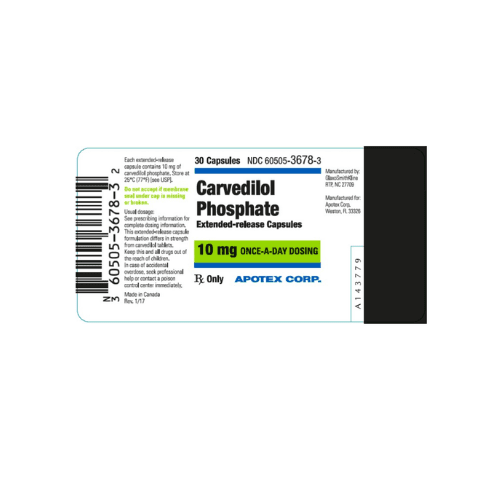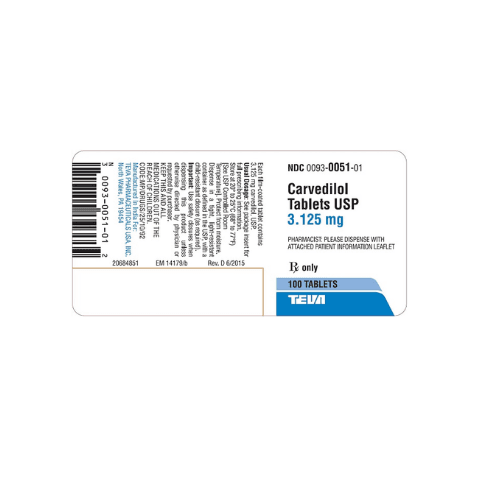Shipping with this method takes 3-5 days
Carvedilol Tablets for Heart Failure
$42.99
Secure Encrypted Payments
Carvedilol is a beta blocker for heart failure and high blood pressure. It helps the heart work more efficiently and reduces strain on the circulation. This page explains essentials for safe use, access, and storage, with US delivery from Canada and a clear view of carvedilol price without insurance.
What Carvedilol Is and How It Works
Carvedilol blocks beta and alpha receptors, which helps slow heart rate, lower blood pressure, and reduce workload on the heart. It can improve symptoms in chronic heart failure and support recovery after a heart attack with left ventricular dysfunction. The treatment may be used alone or with other heart medicines based on your prescription.
YouDrugstore is a licensed Canadian pharmacy in Manitoba. Pharmacists review prescriptions before dispensing.
This medicine is taken regularly to maintain control. Food can reduce the chance of dizziness when starting or increasing the dose. If you are comparing carvedilol cost, note that immediate-release tablets and extended-release capsules are different products.
Who It’s For
This therapy is indicated for adults with chronic heart failure, including those stabilized on standard background therapy. It is also used to treat hypertension and to reduce cardiovascular risk after a heart attack with left ventricular dysfunction.
People with asthma or severe chronic obstructive pulmonary disease may not be candidates due to possible bronchospasm. Those with severe liver impairment, very low heart rate, cardiogenic shock, or second- or third-degree heart block without a pacemaker should avoid it. Discuss your health history with a healthcare professional before starting. Learn more about related conditions such as Heart Failure and Hypertension, and see our broader Cardiovascular category.
Dosage and Usage
Follow the directions on your prescription label. Immediate-release tablets are typically taken twice daily with food. The extended-release capsule is taken once daily in the morning with food. Your prescriber may start low and adjust over time according to tolerance and response.
Swallow tablets whole with water. For extended-release, swallow capsules whole and do not crush or chew. If swallowing is difficult, ask your prescriber or pharmacist about options rather than altering the form.
Rising slowly from sitting or lying can help reduce dizziness. Avoid abrupt discontinuation unless your prescriber advises otherwise, as stopping suddenly can worsen heart symptoms.
Strengths and Forms
Common immediate-release tablet strengths include 3.125 mg, 6.25 mg, 12.5 mg, and 25 mg. Extended-release capsule strengths may include 10 mg, 20 mg, 40 mg, and 80 mg. Availability can vary by manufacturer and region.
Different products are not automatically interchangeable. If you are price-checking across strengths, you may see listings such as carvedilol 12.5 mg price reported separately from other tablet sizes. Your prescription determines which form is appropriate.
Missed Dose and Timing
If you miss a dose, take it when remembered unless it is close to the next dose. If it is nearly time for the next dose, skip the missed dose and continue on schedule. Do not double up. If several doses are missed, contact your prescriber for guidance before restarting.
Storage and Travel Basics
Store tablets at room temperature in a dry place away from excess heat and moisture. Keep in the original container with the label intact, out of reach of children and pets. Do not store in the bathroom. Use a pill organizer only if it preserves dryness and labeling.
When traveling, carry your prescription-labeled container in your hand luggage. Bring a copy of your prescription and a medication list for security or customs. Pack enough for your trip plus a small buffer in case of delays. If crossing time zones, maintain consistent intervals based on your home schedule and ask a pharmacist if unsure.
Benefits
This therapy can reduce blood pressure and ease the heart’s workload. It may improve exercise tolerance in chronic heart failure when used as directed. Taking it with food can help lessen early dizziness. Having both immediate-release and extended-release options gives prescribers flexibility for different dosing schedules.
Side Effects and Safety
- Dizziness or lightheadedness
- Fatigue or low energy
- Low blood pressure
- Slow heart rate
- Diarrhea or upset stomach
- Weight gain or fluid retention
- Headache
Serious effects can include worsening heart failure symptoms, bronchospasm in susceptible individuals, fainting, or significant heart rhythm changes. Seek urgent care if you experience chest pain, severe shortness of breath, or swelling of the face or throat. Beta blockers can mask signs of low blood sugar; take extra care if using insulin or sulfonylureas and monitor as advised by your clinician.
Drug Interactions and Cautions
Use caution with non-dihydropyridine calcium channel blockers like verapamil or diltiazem due to additive effects on heart rate and conduction. Clonidine, amiodarone, and digoxin require careful monitoring. CYP2D6 inhibitors may increase levels. Rifampin may reduce exposure. Alcohol can enhance dizziness. Always share a full medication list, including over-the-counter items and supplements.
ACE inhibitors and diuretics may intensify blood pressure lowering. If using anticoagulants like warfarin, ensure regular monitoring as overall regimen changes may influence stability. For a broader overview, see Top Interactions and learn about potential issues in Warfarin Side Effects. Some patients on combination therapy may also use ACE inhibitors such as Enalapril; coordination with your prescriber is key.
What to Expect Over Time
Your prescriber may start low and adjust in steps. Some tiredness or dizziness can occur early on, especially when standing. Taking doses with food and staying hydrated may help. Over time, consistent use can help maintain blood pressure control and support heart function. For lifestyle guidance alongside therapy, see our article on ways to Treat Hypertension.
Compare With Alternatives
Other options may be considered depending on your condition and tolerance. Your prescriber may compare a nonselective agent with alternative beta blockers or choose a different class.
Two commonly prescribed alternatives we offer include Propranolol Hcl and the calcium channel blocker Nifedipine Xr. Each medicine has distinct properties, dosing schedules, and precautions. Selection depends on your diagnosis, coexisting conditions, and the rest of your regimen.
Pricing and Access
We keep a transparent view of carvedilol price and show available manufacturers and pack sizes. You can also review carvedilol cash price relative to extended-release options and brand-name equivalents where listed. Savings vary by product and quantity.
Ordering includes easy checkout and status tracking. Our platform uses encrypted checkout to protect your information. Ships from Canada to US with reliable fulfilment. If you look for deals, check our current Promotions.
Availability and Substitutions
Availability can vary by strength, pack size, and manufacturer. Extended-release versions and branded options like Coreg CR may have different supply patterns and pricing. If a specific strength is unavailable, your prescriber may recommend a therapeutically appropriate alternative or temporary adjustment. We reflect carvedilol Canadian pricing clearly on each product page so you can compare options before placing an order.
Patient Suitability and Cost-Saving Tips
Patients with asthma, severe bradycardia, or significant liver disease are often not suitable for this therapy. Those with diabetes should monitor blood sugar closely and recognize that symptoms of hypoglycemia may be less noticeable. Report persistent dizziness, swelling, or wheezing to your prescriber.
To lower overall costs, consider multi-month fills when appropriate. Set refill reminders so you do not run out unexpectedly. When your prescriber agrees, staying with one form can simplify follow-ups. For condition education, see our quick read on Heart Facts. If your clinician changes your regimen, review the updated label before your next order.
Questions to Ask Your Clinician
- Is the immediate-release tablet or the extended-release capsule a better fit for my schedule?
- How should I monitor for low blood pressure or slow heart rate at home?
- What signs suggest worsening heart failure and when should I seek care?
- Do any of my current medicines raise the risk of heart block or dizziness?
- Could a different class, such as a calcium channel blocker, be right for me?
- What is the plan if I miss several doses or feel unwell after a dose change?
Authoritative Sources
Health Canada Drug Product Database
FDA MedWatch: Report a Side Effect
Order from YouDrugstore for US shipping from Canada with prompt, express, temperature-controlled handling when required. This information is educational and not a substitute for your prescriber’s advice.
Express Shipping - from $25.00
Prices:
- Dry-Packed Products $25.00
- Cold-Packed Products $35.00
Shipping Countries:
- United States (all contiguous states**)
- Worldwide (excludes some countries***)
Standard Shipping - $15.00
Shipping with this method takes 5-10 days
Prices:
- Dry-Packed Products $15.00
- Not available for Cold-Packed products
Shipping Countries:
- United States (all contiguous states**)
- Worldwide (excludes some countries***)
How does carvedilol differ from other beta blockers?
Carvedilol blocks both beta and alpha receptors, which helps lower blood pressure and reduce strain on the heart. Many beta blockers act mainly on beta receptors. This broader activity can be useful in chronic heart failure and post–heart attack care, depending on the treatment plan. Your clinician will consider your diagnosis, other medicines, and heart rate when choosing among options. Do not switch agents without medical guidance.
Can I switch between immediate-release tablets and extended-release capsules?
They are not directly interchangeable on a milligram-to-milligram basis. The extended-release capsule is taken once daily, while the immediate-release tablet is taken twice daily, typically with food. Any conversion should follow an approved schedule from your prescriber. Always check the label instructions when a pharmacy changes the manufacturer or form, and ask if you notice a new tablet or capsule appearance.
What should I do if I feel dizzy after a dose?
Dizziness is common when starting or increasing the dose. Taking doses with food, rising slowly, and staying hydrated may help. Avoid driving or hazardous tasks until the feeling passes. If dizziness is severe, persistent, or associated with fainting, contact your prescriber. Do not stop suddenly unless your clinician advises it, because abrupt withdrawal may worsen heart symptoms in some patients.
Is it safe with asthma or chronic lung disease?
Beta blockers can provoke bronchospasm in some individuals with asthma or severe COPD. Carvedilol may not be appropriate if you have active bronchospasm or a history of severe reactions. Your prescriber may choose a different class or add careful monitoring. Report new wheezing or shortness of breath promptly. Always provide your full respiratory history before starting therapy.
Can it mask low blood sugar symptoms?
Yes. Beta blockers can blunt early adrenergic warning signs of hypoglycemia, such as tremors or palpitations. This effect is most relevant for people using insulin or sulfonylureas. Regular glucose monitoring and awareness of non-adrenergic symptoms like sweating are important. Discuss a monitoring plan with your healthcare professional, especially during dose changes or if you have a history of low readings.
How should I store it at home and during travel?
Keep tablets at room temperature in a dry place away from moisture and heat. Store in the original, labeled container and out of children’s reach. For travel, pack it in hand luggage with your prescription and a medication list. Bring enough supply for your trip plus a small buffer. Maintain consistent dosing intervals across time zones, and ask a pharmacist if you need help adjusting times.
What if my blood pressure stays high on therapy?
Therapy plans often include more than one medicine for blood pressure or heart failure. If readings stay above target, your prescriber may adjust the dose, add another agent, or review adherence and lifestyle factors. Do not change doses on your own. Keep a log of home readings and symptoms. Share the list with your clinician, who will guide the next steps based on your overall plan.

